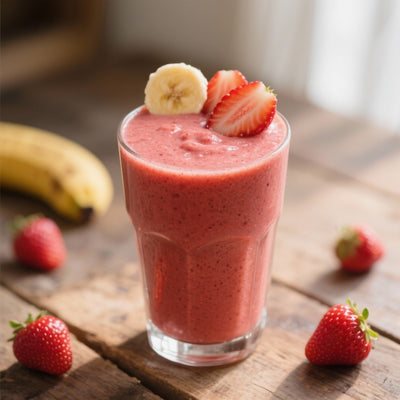Why Quitting Sugar Abruptly Creates Serotonin Deficiencies
Sugar, ubiquitous in our modern diet, is often singled out for its harmful effects on physical health. However, its impact on our mental well-being is less well-known, but just as important. Many consider abrupt withdrawal to break this addiction, but this approach can lead to unexpected consequences, including a significant drop in serotonin. This article explores the link between sugar and serotonin in depth and offers alternatives for a gentle and sustainable withdrawal.
We'll break down the biological mechanisms behind this deficiency, the symptoms to watch for, and most importantly, strategies for maintaining stable serotonin levels while reducing your sugar intake. Whether you're new to nutrition or an expert looking for solutions, this comprehensive guide will provide clear answers and practical advice.
The Troubled Link Between Sugar and Serotonin
Serotonin, often called the "happiness hormone," plays a crucial role in regulating mood, sleep, appetite, and even digestion. Sugar indirectly influences its production. When we consume sugar, the body releases insulin to regulate blood sugar levels. This insulin allows tryptophan, an amino acid precursor to serotonin, to cross the blood-brain barrier more easily. In other words, sugar temporarily facilitates serotonin production, creating a feeling of well-being and immediate pleasure.
However, this process is far from sustainable. Excessive sugar consumption depletes tryptophan reserves, and the spikes and drops in blood sugar disrupt long-term hormonal balance. Furthermore, sugar promotes chronic inflammation, which can also interfere with serotonin production and function. It's a vicious cycle: we consume sugar to feel better, but we end up worsening the problem.
Why is a sudden stop to sugar problematic?
When sugar consumption is abruptly stopped, the body, accustomed to this artificial boost of serotonin, experiences withdrawal. Serotonin levels can plummet, leading to various unpleasant symptoms such as:
- Irritability and mood swings
- Anxiety and depression
- Sleep disorders (insomnia or hypersomnia)
- Fatigue and lack of energy
- Headaches
- Irresistible sugar cravings
These symptoms, often grouped under the term "sugar withdrawal," can be intense and discouraging, making it difficult to maintain a healthy diet in the long term. It is therefore crucial to adopt a gentler, more gradual approach.
Recognizing the Symptoms of a Serotonin Deficiency
It's important to know how to identify the signs of a serotonin deficiency, especially if you're planning to reduce your sugar intake. Some symptoms can be similar to those of sugar withdrawal, but persist even after a few weeks:
- Persistent depressive mood
- Difficulty experiencing pleasure (anhedonia)
- Obsessive-compulsive disorder (OCD)
- Impulsiveness
- Memory and concentration problems
- Digestive problems (constipation, irritable bowel syndrome)
If you experience several of these symptoms, it is advisable to consult a healthcare professional to assess your serotonin levels and explore potential causes.
Alternatives and Strategies for a Gentle Weaning
The key to successfully quitting sugar lies in a gradual and well-planned approach. Here are some effective strategies to reduce your sugar intake without compromising your serotonin levels:
- Gradually reduce the quantities: Slowly decrease your consumption of added sugar (sodas, candy, pastries). Replace sugary drinks with water, herbal teas, or sugar-free alternatives.
- Favor natural sugars: Opt for fresh fruit, rich in fiber and antioxidants, rather than processed products. Consume them in moderation, as they still contain fructose.
- Increase your tryptophan intake: Incorporate tryptophan-rich foods into your diet, such as poultry, eggs, nuts, seeds, legumes, and dairy products.
- Favor foods rich in magnesium: Magnesium is essential for the production of serotonin. It is found in green vegetables, nuts, seeds and dark chocolate (in moderation!).
- Engage in regular physical activity: Physical exercise stimulates serotonin production and improves mood.
- Managing stress: Chronic stress can deplete serotonin reserves. Practice relaxation techniques such as meditation, yoga, or deep breathing.
- Ensuring quality sleep: Sleep is crucial for the production and regulation of serotonin. Adopt a regular sleep routine and create an environment conducive to rest.
"Weaning yourself off sugar is a marathon, not a sprint. Be patient and kind to yourself." - Dr. Martine Dupond, nutritionist.
Specific Foods to Naturally Boost Serotonin
Certain foods are particularly beneficial for naturally stimulating serotonin production:
- Salmon: Rich in omega-3 fatty acids, which promote communication between nerve cells and improve mood.
- Eggs: A source of tryptophan, choline, and vitamin D, essential for brain health.
- Nuts and seeds: Almonds, cashews, pumpkin seeds, sunflower seeds... Rich in tryptophan, magnesium and antioxidants.
- Pineapple: Contains bromelain, an enzyme that aids in protein digestion and tryptophan absorption.
- Bananas: Source of tryptophan, potassium and vitamin B6, which contribute to the production of serotonin.
When to Consult a Professional
If serotonin deficiency symptoms persist despite your efforts, or if you suffer from severe mood disorders, it is important to consult a doctor or psychotherapist. They can assess your situation and offer appropriate treatment, which may include cognitive behavioral therapy (CBT) or, in some cases, antidepressant medication.
Conclusion: A Gentle Weaning Process for Lasting Well-being
Quitting sugar cold turkey can negatively impact your serotonin levels and overall well-being. By taking a gradual approach, prioritizing foods rich in tryptophan and magnesium, and managing your stress, you can reduce your sugar intake without compromising your emotional balance. Remember that everyone is different, and it's important to tailor your approach to your individual needs and lifestyle. Successfully cutting back on sugar is a long-term investment in your physical and mental health.
Want to go further? Discover our healthy and delicious recipes without added sugar to support you on your journey. Also explore our articles on stress management and emotional well-being for a holistic approach to your health.











